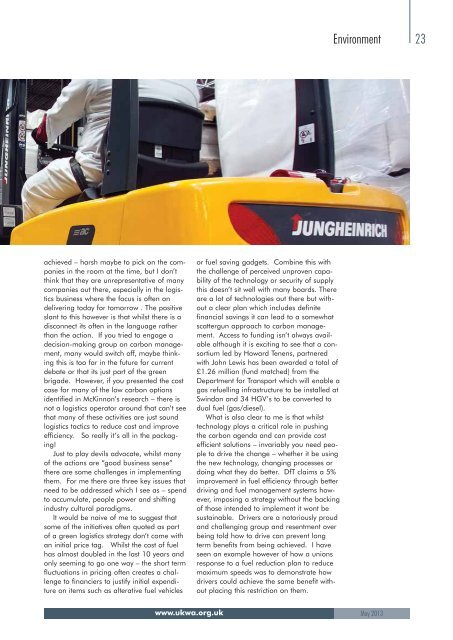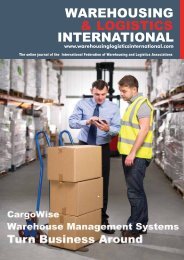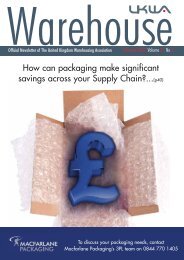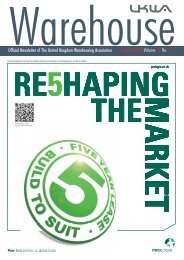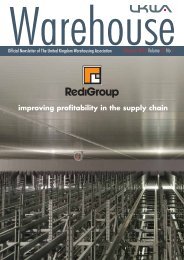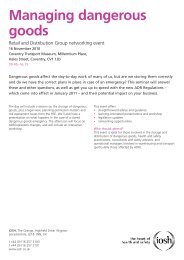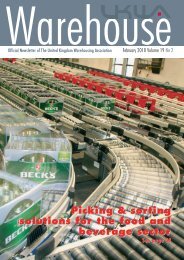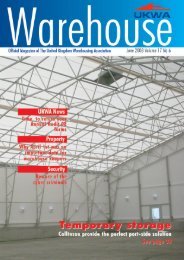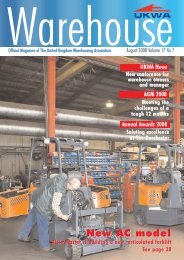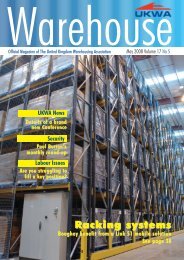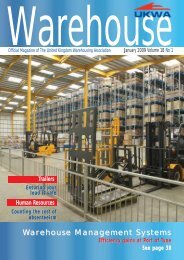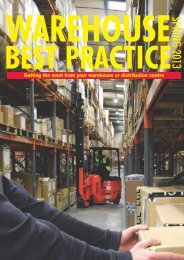Warehouse - United Kingdom Warehousing Association
Warehouse - United Kingdom Warehousing Association
Warehouse - United Kingdom Warehousing Association
Create successful ePaper yourself
Turn your PDF publications into a flip-book with our unique Google optimized e-Paper software.
Environment 23achieved – harsh maybe to pick on the companiesin the room at the time, but I don’tthink that they are unrepresentative of manycompanies out there, especially in the logisticsbusiness where the focus is often ondelivering today for tomorrow . The positiveslant to this however is that whilst there is adisconnect its often in the language ratherthan the action. If you tried to engage adecision-making group on carbon management,many would switch off, maybe thinkingthis is too far in the future for currentdebate or that its just part of the greenbrigade. However, if you presented the costcase for many of the low carbon optionsidentified in McKinnon’s research – there isnot a logistics operator around that can’t seethat many of these activities are just soundlogistics tactics to reduce cost and improveefficiency. So really it’s all in the packaging!Just to play devils advocate, whilst manyof the actions are “good business sense”there are some challenges in implementingthem. For me there are three key issues thatneed to be addressed which I see as – spendto accumulate, people power and shiftingindustry cultural paradigms.It would be naive of me to suggest thatsome of the initiatives often quoted as partof a green logistics strategy don’t come withan initial price tag. Whilst the cost of fuelhas almost doubled in the last 10 years andonly seeming to go one way – the short termfluctuations in pricing often creates a challengeto financiers to justify initial expenditureon items such as alterative fuel vehiclesor fuel saving gadgets. Combine this withthe challenge of perceived unproven capabilityof the technology or security of supplythis doesn’t sit well with many boards. Thereare a lot of technologies out there but withouta clear plan which includes definitefinancial savings it can lead to a somewhatscattergun approach to carbon management.Access to funding isn’t always availablealthough it is exciting to see that a consortiumled by Howard Tenens, partneredwith John Lewis has been awarded a total of£1.26 million (fund matched) from theDepartment for Transport which will enable agas refuelling infrastructure to be installed atSwindon and 34 HGV’s to be converted todual fuel (gas/diesel).What is also clear to me is that whilsttechnology plays a critical role in pushingthe carbon agenda and can provide costefficient solutions – invariably you need peopleto drive the change – whether it be usingthe new technology, changing processes ordoing what they do better. DfT claims a 5%improvement in fuel efficiency through betterdriving and fuel management systems however,imposing a strategy without the backingof those intended to implement it wont besustainable. Drivers are a notoriously proudand challenging group and resentment overbeing told how to drive can prevent longterm benefits from being achieved. I haveseen an example however of how a unionsresponse to a fuel reduction plan to reducemaximum speeds was to demonstrate howdrivers could achieve the same benefit withoutplacing this restriction on them.www.ukwa.org.uk May 2013


